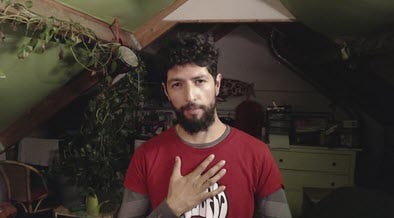Philosophy starts with the body!
A short speech to reclaim an (or perhaps even THE?) original way to practice philosophy
Philosophy is an embodied practice first
video length ~ 6 min
Transcript:
Philosophy is an embodied practice first.
I would like to suggest that philosophy should be primarily an embodied practice and second an intellectual one.
While everyone tends to agree that philosophy is a good way to develop wisdom, it's traditionally presented with an emphasis on people having to study lots of complex books for a long time before being able to apply their wisdom.
Yet when we subject philosophy professors to ethics exams, they are not performing any better than the average population. There seems to be a gigantic disconnect between the energy input to understand the classics of philosophy and the ability to walk the talk.
The irony is that I believe there is already in people’s life lots of opportunities to engage in philosophy, when it’s associated with a physical activity of their own choosing.
I am here to argue that traditional style of teaching philosophy is elitist and tends to be counterproductive at inspiring people to pursue wisdom.
That throughout history, there were philosophers trying to make this love of wisdom a daily embodied practice as a mean to build a loop of generation and validation of insights for growth.
And that reconnecting to our bodies with a spirit of playful exploration entwined with a reflective and contemplative practice, can fulfill our lives and deliver on the promise that philosophy is bearing.
My first observation is that currently philosophy is often taught with the premise that you have to provoke people’s certainties, pressure them long enough with tough questions and somehow down the line they will wake up to the fact they are ignorant. Then a newfound love for revisiting what they know will emerge with an emphasis on humility.
My hunch is that most of us feel caught off guard, tense up and do not engage in proper Socratic dialogue and we do not enjoy the experience. In the meantime, the discipline likes to attract at best people who like reading and writing with high density and perhaps even overthink. Or in the worst case, attracts the ones that use philosophers quotes out of context to win arguments and impress others.
Which brings me to the fact some philosophers were more embodied than most. Movement was understood as the main driver for their insights and their empirical validation.
Plato’s Gymnasium comes to mind where you were wrestling and working out as you had engaging lectures. Let me remind you that Socrates himself was a soldier in three military campaigns against Sparta before confronting people in the agora.
Nietzsche who was an relentless hiker even said that “All truly great thoughts, are conceived while walking.”
Which leads me to my final point that genuine philosophy starts with the body.
What is a thought but the product of a brain, an emotion stored in the nervous system and tissues throughout the body and then formulated by our vocal cords, tongue, mouth and of course language.
Is it that far of a leap to understand that a body that doesn’t move will likely produce rigid thinking?
Everyone can attest how difficult it is to seek clarity when our bodies are not fed, unhealthy, and under high stress.
In contrast, have you noticed how everything seems more manageable when you have a long contemplative walk in nature, or simply …. taken a few deep breaths???
On a personal note, I remember being very sad one day last year.
And after going that very same evening to my Jiu-Jitsu class, I was exhausted; … but my mind had also somehow moved on. I think and feel that I had in real life and metaphorically survived what I was grappling with. That it had helped me shift my perspective and gain clarity much faster that if I had gone to read some Schopenhauer, Marcus Aurelius or Eckhart Tolle. Soon after I felt I had a much easier time being present as a father for my two sons.
To wrap up, my point is that when we present philosophy as an intellectual, arcane, and disembodied discipline, we are mistaking the finger for the moon; and teaching philosophy only through discourse and writing is not proving very effective to neither inspire you to think for yourself, nor making you any wiser.
Traditionally the earliest schools of thought had the body as the laboratory for their ideas and we mentioned the Gymnasium for Plato, and how Nietzsche had embraced hikes for inspiration.
Then I moved on to provide common examples where an unhealthy body will likely produce poor judgement and how grappling in real life, or simply breathing deeply can prove to be more effective than absorbing philosophical propositions.
When we move and connect with our bodies with the right questions; focus on our sensations and how they evolve; and when we refine those insights with humility; we ARE engaging in philosophy in a very refreshing and inspiring way.
In essence: Move first. Notice. Then insights will follow. Soon after you will likely walk the talk.
This sharpens our intuition and gives us the reps to cultivate nuance, restraint, temperance and hold multiple perspectives at once. Which are essential skills to regain a bit of sovereignty in an ever-complex world.



